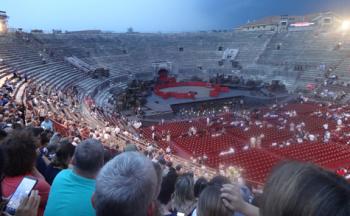Opera at Verona Arena
This item appears on page 46 of the December 2018 issue.
Enjoying opera at the Verona Arena was first on our list when my sister and I decided to visit Verona, Italy, in summer 2018.
The Arena is a Roman amphitheater built in the first century AD, about 50 years before the Colosseum was built in Rome. It's elliptically shaped, with concentric galleries, and, counting the chairs on the field and the stadium seating facing the stage, it seats about 30,000 people.
Since 1913, the Arena has been used for concerts and opera performances under the open sky. The ticket office is located behind the amphitheater, which is where my sister and I bought our tickets the day we arrived in Verona. Depending on the distance from the stage, prices ranged from €20 to €25 (near $23-$28.50) in the stands to €161-€192 in chairs on the field.
We bought two €25 tickets for Georges Bizet's "Carmen," scheduled for 8:45 p.m. the next day, Aug. 9. We were told to arrive one hour before the show and to enter through the arches/gates numbered 67-92. Seating was not marked, and early arrival guaranteed a better location.
You can get to the Arena by walking through Piazza Bra. The next day, because of the large crowds, the square was filled with soldiers holding weapons.
Everything seemed well organized, with all spectators going through a security check. Large bottles of water (1 liter) were taken, but we could keep our small ones (0.5L).
We were helped to a good spot opposite the center of the stage. Anticipating a nice, cool evening under shining stars, we hadn't taken any jackets or umbrellas with us. Some people rented plastic pads (€3), but we enjoyed sitting on stone that was still warm after a 92°F day. It was nice to watch people arriving and vendors running with drinks, sandwiches and ice cream.
About the time the musicians started tuning their instruments, black clouds began to appear on the horizon. A sudden, strong, cold wind then questioned our festive mood. With the first drops of rain (which hadn't been in the forecast!), an announcement was made saying the performance was being delayed so the instruments wouldn't be damaged by the rain.
Umbrellas and raincoats appeared here and there. We had none of these, however, so we ran downstairs and stood under an arch. A powerful thunderstorm was in full swing, but it was dry and even warm under our arch because people were standing shoulder to shoulder.
Later, a few enthusiasts came out soaked and chilled to the bone. Some of them left, but most people stayed under the arches. Having my book helped me endure this unexpected waste of time.
According to the rules, during bad weather, administration can wait up to 2½ hours before canceling a performance. After that, visitors can get their money refunded within the next 15 days.
In our case, that meant waiting until 11:15 p.m. Everyone's smartphones said the rain would continue long after midnight, so we had already given up hope of hearing "Carmen," but walking 20 minutes to our apartment in the pouring rain would not have been wise. We stayed.
The rain stopped five minutes before 11 p.m., and 10 minutes later the performance finally started. "Carmen" has four acts and lasts about 2½ hours, with intermissions of 20, 15 and 10 minutes each. The opera continued until 2:20 a.m.
Wet and cold conditions were difficult not only for the public but for the singers as well. After the second act, they announced that one of the mezzo sopranos would be replaced by another. (Isn't it amazing to have another singer available after 1 a.m.?)
For three weeks of our journey in Europe, it was the only rain. What luck! I must admit, though, that it was an unforgettable night for everyone who waited two hours at the Arena to hear beautiful opera, supporting the musicians and singers with energetic applause and ovations.
IRINA STROUP
Redding, CA

